advancing marine education and conservation
Marine Ecosystems
Marine ecosystems include coral reef, kelp forest, seagrass, rocky shore, tidal pool, tidal flat, subtidal soft bottom, salt marsh, mangrove, photic and aphotic deep sea pelagic, abyssal plain, deep-sea hydrothermal vent and Arctic and Antarctic cold-water communities. Approximately 226,000 of the estimated 320,000 to 972,000 marine organisms that live in these communities have been described by scientists (Appeltans et al. 2012). Of the marine species that have been described, approximately 200,000 are animals and 7,600 are plants.
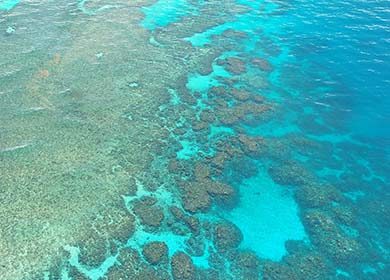
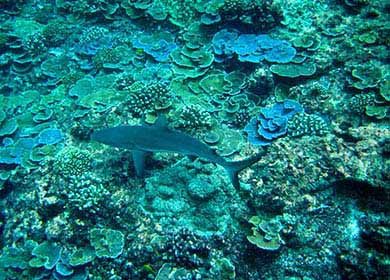
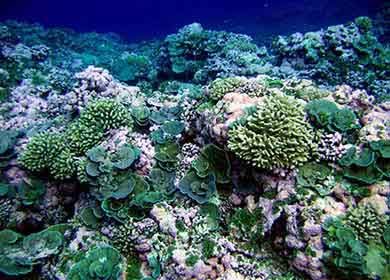
Coral Reefs
Coral reefs are among the most diverse and productive ecosystems on earth. Coral reefs provide habitat in the form of food and structure to many marine organisms. Around the planet, corals are disappearing at an alarming rate. From 1985 to 2012, the mean coverage of coral on the Great Barrier Reef decreased by 50.7 percent. Since 2006, the rate of loss of Great Barrier Reef coral coverage has increased substantially (De ath et al. 2012). In the Caribbean, from 1977 to 2002, the average hard coral cover of coral reefs has decreased by 80 percent (Gardner et al. 2003), a decrease of about 5 percent per year (Gardner et al. 2003, Cote et al. 2005). Declines in coral reef communities are being caused by human population growth and coastal development, overfishing, coastal water pollution, invasive species and global warming (Jackson et al. 2014, De ath et al. 2012). Currently, approximately 27 percent of coral reefs are located in marine protected areas (Burke et al. 2011).
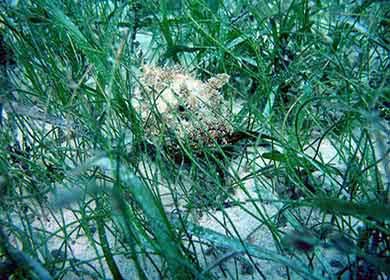
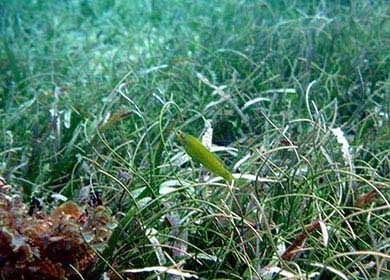
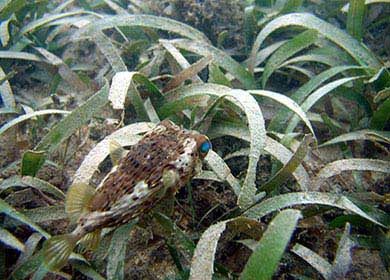
Seagrasses
Seagrasses are one of the most productive ecosystems on the planet. They support marine fisheries, produce food for species such as manatees and sea turtles and provide ecosystem services such as carbon storage and nutrient cycling. Between 29 (1879 to 2006) to 65 percent of seagrasses globally have disappeared (Waycott etal 2009, Lotze et al 2006). In an effort to clean coastal waters and restore estuarine and nearshore marine ecosystems, government agencies, university researchers and private NGOs are restoring oyster reefs on a large scale. Oyster reefs increase light penetration, improve habitat for seagrasses and allow for seagrass restoration.
References
Appeltans, W., Ahyong, S.T., Anderson, G., Angel, M.V., Artois, T., Bailly, N., Bamber, R., Barber, A., Bartsch, I., Berta, A. and Blazewicz-Paszkowycz, M., 2012. The magnitude of global marine species diversity. Current Biology, 22(23), pp.2189-2202.
- Burke, L., Reytar, K., Spalding, M. and Perry, A. Reefs at risk revisted. 2011. World Resources Institute. Washington, D.C.
Cote, I.M., Gill, J.A., Gardner, T.A. and Watkinson, A.R., 2005. Measuring coral reef decline through meta-analyses. Philosophical Transactions of the Royal Society of London B: Biological Sciences, 360(1454), pp.385-395.
- De ath, G., Fabricius, K.E., Sweatman, H. and Puotinen, M., 2012. The 27 year decline of coral cover on the Great Barrier Reef and its causes. Proceedings of the National Academy of Sciences, 109(44), pp.17995-17999.
Gardner, T.A., Cote, I.M., Gill, J.A., Grant, A. and Watkinson, A.R., 2003. Long-term region-wide declines in Caribbean corals. Science, 301(5635), pp.958-960.
- Jackson, J.B.C., Donovan, M.K., Cramer, K.L. and Lam, V.V., 2014. Status and trends of Caribbean coral reefs. Gland: Global Coral Reef Monitoring Network, IUCN. Available at http://cmsdata. iucn. org/downloads/caribbean coral reefs status report 1970 2012. pdf.
- Lotze, H.K., Lenihan, H.S., Bourque, B.J., Bradbury, R.H., Cooke, R.G., Kay, M.C., Kidwell, S.M., Kirby, M.X., Peterson, C.H. and Jackson, J.B., 2006. Depletion, degradation, and recovery potential of estuaries and coastal seas. Science, 312(5781), pp.1806-1809.
Waycott, M., Duarte, C.M., Carruthers, T.J., Orth, R.J., Dennison, W.C., Olyarnik, S., Calladine, A., Fourqurean, J.W., Heck, K.L., Hughes, A.R. and Kendrick, G.A., 2009. Accelerating loss of seagrasses across the globe threatens coastal ecosystems. Proceedings of the National Academy of Sciences, 106(30), pp.12377-12381.